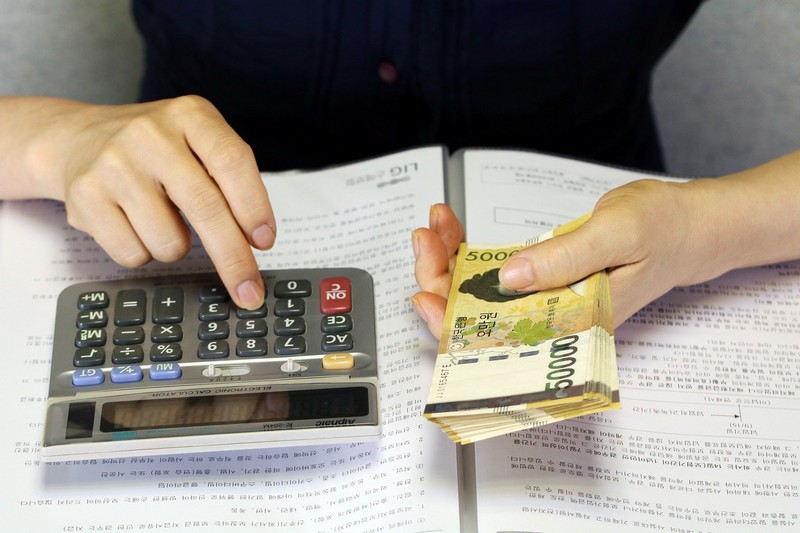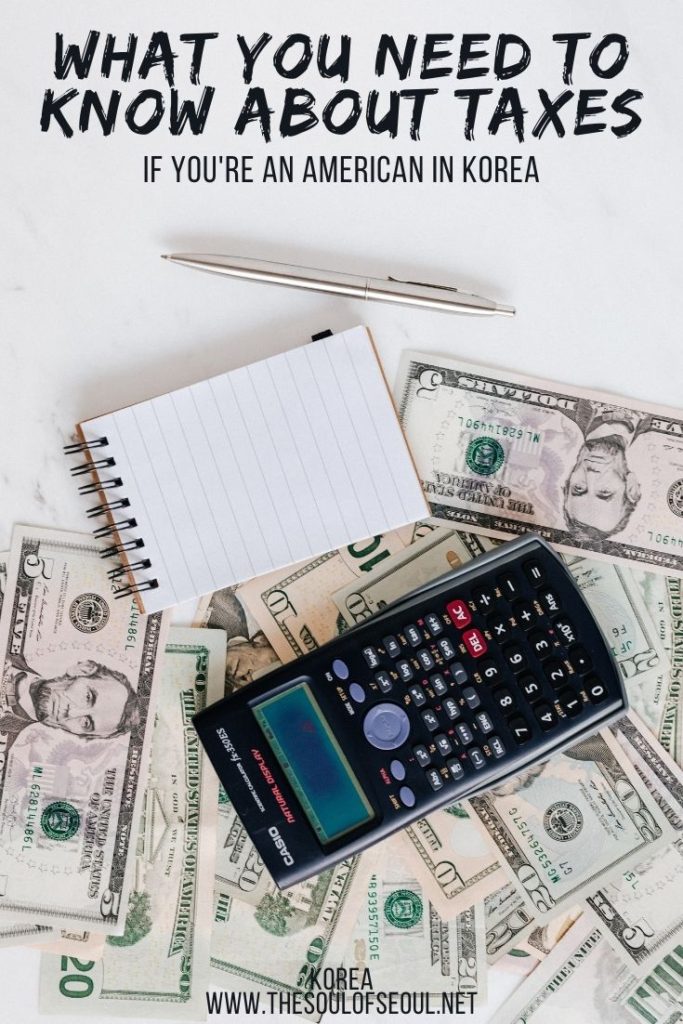What You Need To Know About Taxes If You’re An American In Korea
Have you moved to Korea? Working as an ESL teacher for a year or starting a business perhaps? Whether you’re living here for a short time or long term, you’ll want to be aware of what you need to do to file taxes.
Did you know, as an American, you’re expected to file taxes every year no matter where you’re living? Not every country requires this but as an American expat, it is your responsibility to file taxes.
If you’re an American living in Korea, make sure you know how to file taxes from abroad. If at some point you move home and you never filed, you could find yourself owing quite a bit of money to Uncle Sam. Don’t do that! Here is a tax guide for American expats living in Korea.

(This post contains affiliate links, which means I receive a certain percentage of a sale if you purchase after clicking at no cost to you. Thank you for your support.)

Since I’m no tax expert, though I have filed every year since I’ve been in Korea, I tapped on CPA Marc J. Strohl for the details and information you’ll want to know to file your taxes this year. Marc J. Strohl, CPA is a multi-state licensed Certified Public Accountant. He was awarded membership by the American Institute of Certified Public Accountants (AICPA), and was awarded membership in to the New York State Society of Certified Public Accountants (NYSSCPA). Marc earned a Master’s degree in Public Accountancy from the prestigious Canadian educational institution McGill University. Marc believes that Protax’s clients are its most important assets and he is fully committed to treating them with professional respect, professional care and the utmost regard.
Rapid economic growth providing lots of business and job opportunities, attractive salaries, and an affordable cost of living – these are only a few of the benefits of moving to South Korea.
In recent times, the country has opened its borders for US expats wishing to relocate. Expats can live in various landscapes ranging from beaches to thriving metropolitan cities. Retirees can also move to South Korea, also known as the “Land of the Morning Calm.”
Understanding taxation laws should be high on your list of priorities
If you’ve been contemplating a move to South Korea or living here for some time, one of the most important things to have in order is your financials. Working out your income and taxes you owe the government is critical, or you risk incurring penalties from the IRS.
The most important fact to keep in mind is that as long as you continue to hold US citizenship or a Green Card, you’ll file tax returns with the IRS each year. This rule applies regardless of whether your income falls under the taxable bracket or even if you’ve chosen to get permanent residency in South Korea.
At the same time, you’ll comply with the taxation laws in the new host country. Read ahead for some in-depth information about tax issues you absolutely must know.
US taxation laws expect citizens to declare income from all sources
The US IRS expects American expats to declare their worldwide income from all sources in their tax returns. Work with an expert tax consultant for filing taxes as a US expat in South Korea and get advice on the relevant forms that you must complete and submit. For instance, the FinCen Form 114 carries details of all the assets you hold in bank accounts in foreign countries.
Additionally, the Foreign Bank and Financial Accounts Report (FBAR) can be filed by individuals or jointly in case of spouses. If the total value in foreign bank accounts exceeds $10,000 at any time within the fiscal year, submitting the FBAR is mandatory. A US expat who is a bona fide Korean resident is also liable to pay taxes to the Korean government in all worldwide income.
You’re considered a resident of the country if you’ve been working and living on Korean soil for at least 183 consecutive days. For taxation purposes, people who have domiciled in South Korea for 12 months or more are permanent residents.
Taxation rates in South Korea
Foreigners living and working in Korea can pay a flat income or employment tax of 19% on their gross earnings. Or, they’ll pay a progressive rate of 6% to 38% on the income they earn. The maximum rate goes up to 42% on income above the Korean Won 500 million. An additional 10% resident tax is also applicable. Any interest and dividends you earn from investments are taxed at similar rates. Any capital gains incur 10% of the sales proceeds in taxes or 20% of the profits.
Taxation rates in the US
Taxation rates in the US are fixed according to income brackets. For instance, in recent years, 12% on income ranging from $9,876 to $40,125 and 24% on income between $85,526 and $163,300. Married couples filing joint returns or parents supporting kids typically pay lower taxes.
US expats filing tax returns can exclude $107,600 from their total income and pay taxes on the total income over and above this figure. Each year, the IRS adjusts the Foreign Earned Income Exclusion (FEIE) amount to account for inflation. When preparing the paperwork, you might want to check with an accountant for the tax rates, brackets, and exclusions available for that financial year.

No, you won’t pay double taxes
South Korea and the US signed a Totalization Agreement in 2011, by which US expats are not required to pay double taxation. Americans living in Korea are covered by US Social Security. Any taxes you pay in Korea can be deducted from the total taxes you’re liable to pay to the IRS. This facility is called the Foreign Tax Credit and ensures that residents don’t pay taxes twice on their earned income. Do keep in mind that these taxes are only intended as a savings plan to secure your retirement. If you choose to, you’ll pay 4.5% tax toward the Korean national pension.
Additional taxes payable in South Korea
US expats in Korea are required to pay additional taxes like:
- Mandatory employment insurance tax of 0.55%
- The Industrial Accident Insurance tax ranging from 0.75% to 22.65%
- Any goods and services you purchase in Korea carry a 10% Value Added Tax (VAT).
- Real estate taxes range from 0.24% to 0.6%.
When relocating to South Korea, you’re permitted to bring household items and any other goods for personal use. The only conditions are that these items should not be new and they should arrive in the country within six months of your move. Any things you bring in after this time interval are subject to import duty. Any vehicles, barring Japanese-manufactured cars, can also be brought in.
Fiscal years in South Korea and the US
The fiscal year in South Korea is similar to the US, but don’t get the dates mixed up. You’ll pay taxes to the Korean administration in May of the following year. Though, you’re also expected to clear 50% of your estimated tax dues by November 30th each year. US expats get a maximum deadline of up to June 15th for filing their returns. Under exceptional circumstances, the IRS permits an extension up to October 15th.
Tax-saving strategies US expats can use
US expats can avail of the several tax-saving exclusions made available by the IRS. For instance:
- Foreign Earned Income Exclusion
- Foreign Tax Credit
- Foreign Housing Exclusion
The US IRS accepts that living overseas can be expensive. Accordingly, you can lower your tax liability by claiming housing expenses deductions from the taxable income. To claim this deduction, you’ll prove that you’re a bona fide resident of Korea and have spent 330 days out of 365 days on Korean soil exclusive of any travel time. Here are some of the primary living costs that qualify for exclusions:
- Rent and leasing fees
- Insurance costs on personal property such as homeowner’s and renter’s
- Parking charges
- Repairs
- Renting furniture
- Utilities other than a phone, television cable, and internet

Expenses that are considered extravagances like domestic staff such as maids and housekeepers, mortgage payments, and purchasing furniture cannot be included in your housing exclusion. Do keep in mind that the IRS has specific deductible limits according to the city and area where you live. Check with your tax consultant for detailed information about the expenses you can deduct.
Taxation laws can be complicated and confusing for the layperson. Take your time understanding the taxes US expats must pay and the exclusions that you can use. Stay compliant with the applicable dues to the IRS and your new home country, and avoid possible penalties and fines. If you become confused or bewildered about taxes while abroad, be sure to contact a reliable CPA with knowledge of expat taxes to assist you so there are no errors or mistakes on the numerous documents required for American taxes.
Did you like this post? Pin It!




8 Comments
Virginia Anderson
Hi, I am a US citizen currently married to a Korean national and I am an unemployed housewife but want to start selling handmade crafts online to earn some extra income for the household. I plan to sign up for a business license(개인사업자) and the e-commerce registration(통신판매업 신고증) soon.
I wanted to know that when I file my taxes for the US side, do I need to still fill out a Schedule SE? Or would it just be considered general income and I just file the 1040 form? If I do have to file a Schedule SE, do I need to pay quarterly taxes? I didn’t know if the Totalization agreement omits me from having to file and pay quarterly taxes.
I would like to hire a CPA but I probably won’t make much in the beginning and hiring a CPA is expensive, (lol I plan to sell hand-crocheted dolls). So I wanted to know if filing everything on my own is not as complicated as I making it out to be haha 🙂
Thank you!
Liana Danzi
My daughter teaches English in Korea. We are having trouble getting the Employer name and EIN to match the IRS records to file her tax returns. Is the Business Registration Number the same as the EIN? The Busines Registration Number is from the earned income withholding receipt she received but does not match the IRS records. Do Korean businesses have EINs? If yes, how do we obtain the EIN?
We want to file her US 2021 tax return to get the stimulus payments.
Thanks.
Hallie Bradley
No, a Korean business wouldn’t have an American tax number. You don’t need it for foreign entities. Look closely at the direction on the tax packet because there are specific places to put income earned abroad and how to list a foreign company there.
Jo Gold
I’ve already left the country and returned to the USA. I find that I need to get a complete copy of ALL years of taxes paid while in SK, but I cant find anyone who knows how to request my file from OUTSIDE the USA.
All responses so far have been “You probably need to fly back…” except… COVID for the past 2 years.
Any idea how to go about this?
Will Lee
Thanks for the article. I just finished filing my taxes in Korea thru my company. I received my 2020연말정산내역조회. What is the next process to file my taxes in the states? Should I hire a CPA or use site like Turbo Tax?
Hallie Bradley
It depends what kind of assets you have in the US and other accounts you have I think. I’ve gone the CPA route when I needed to record income from Korea and the US in the same year, etc. But I’ve also done the free-filing options which you can find on the IRS site if it’s pretty straightforward. I’d start with the free-sites the IRS recommends and if you notice that you can’t really get all of your stuff in accurately, then it might be time to hire a CPA. That’s how I’ve done it.
Rebecca Abiel
Hi, Thank you for your information!
I’m a US citizen who got married and living in South Korea. I have F6 visa. I’m a stay home mom. Do I still need to file the US tax return? Thanks in advance!
Hallie Bradley
Yes, you should still file. Since your husband is Korean and won’t be filing there, you still should. Though you don’t have income, you’ll still be up to date in the US and you can get any stimulus checks, be able to claim dependents, and get any credits.